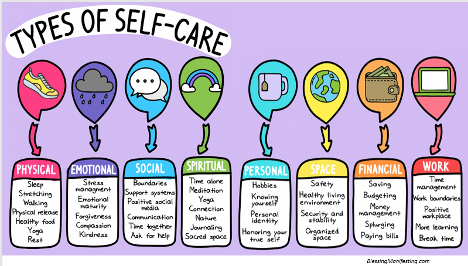BCcampus recently had the privilege of hosting our fifth virtual ACE-WIL town hall, this one about self-care. Sarah Chettleburgh, a counsellor at Royal Roads University, and Miranda Massie, a workplace well-being practices and learning consultant with UBC HR, guided participants through a 45-minute guilt-free virtual pampering session.
Post by Helena Prins, Advisor, Learning + Teaching
For some, even just the topic of self-care would have been a barrier to attendance, or to reading this post. Often, self-care is thought of as frivolous or self-indulgent. Some other barriers identified during the town hall were lack of time, guilt, and a concern that others might question one’s professional dedication when practicing self-care.
Self-care increases empathy and bolsters the immune system and can help to avoid burnout, anxiety, and depression. But you probably already knew that! Why is it, then, that — for many of us — self-care falls to the wayside, despite knowing all the good that can come out of it?
In an article about what “self-care” really means, Brianna Wiest wrote, “True self-care is not salt baths and chocolate cake: it is making the choice to build a life you don’t need to regularly escape from.” As we are living in a COVID-19 world, perhaps setting aside some time to consider how we might thrive during this tumultuous period is worth prioritizing.
For those struggling with how to practice self-care, Sarah provided some questions to consider:
- What makes you feel nourished and re-energized?
- What is something that YOU enjoy?
- What routines/rituals are important to you?
- What makes you feel anxious or drained?
- What boundaries could you create (or dissolve) to support your wellness?
Miranda shared her top five tips for self-care:
- Prioritize positive over negative coping strategies. We all employ a variety of coping strategies to help manage our lives and recharge. However, some are proven to be more effective than others. Effective positive strategies include problem-focused strategies, in which we concentrate on solving a problem (research, strategizing, asking questions); appraisal-focused strategies, in which we attempt to modify how we think (goal setting, humour, shifting our outlook); and emotion-focused coping, in which we look to alleviate negative emotions (workouts, creative activities). We want solutions to be long-term healthy habits, rather than short-lived rewards.
- Adopt strategies that are small and easy to incorporate into daily life. Ensuring that our self-care strategies are small and manageable will help us effectively incorporate them into our daily life without feeling like we have just added something new to our to-do list.
- Choose actions that are low or no cost. For the same reason as point 2, we want things that are low or no cost so that we can eliminate as many barriers as possible between us and successful execution of the activity/strategy/action.
- Make room for professional self-care, too. Self-care does not have to wait until our workday is done. There is evidence to support a range of effective self-care strategies that we can embed into our professional lives so that we get self-care there, too. Professional self-care strategies include finding purpose or meaning in our work, recognition and celebration of small wins, mentorship, and social support.
- Find strategies that reduce your stress in the immediate moment. We want our coping strategies to work for us when we need it. A yoga class at 6 p.m. is not going to help reduce our stress after a difficult conversation at 11 a.m. While yoga is a great activity that has purpose, we also need to think about coping mechanisms that we can use in the moment to help reduce our body’s stress response and manage our emotions effectively, such as professional venting, deep breathing, walking around the block, and counting to ten. Think about what helps lower your stress response and how you could incorporate those actions more frequently, so they become habitual and preventative as well as reactionary.
There are many types of self-care, and this beautiful illustration from the article “Types of Self-Care You Need to Know” on BlessingManifesting.com could serve as a helpful jumping-off point to start thinking about strategies that could work for you and the different facets of yourself that might need more attention and care.

Listen to the self-care town hall to try out two self-care exercises.
For more resources on adapting to a COVID-19 world, explore BCcampus’ website Adapting to COVID-19.
References
- The Resilient Practitioner: Burnout and Compassion Fatigue Prevention and Self-Care Strategies for the Helping Professions, 2nd Edition, Skovholt and Trotter-Mathison, 2011.
- Onward: Cultivating Emotional Resilience in Educators, Elena Aguilar, 2018.
- Self- are: 4 Ways to Nourish Body and Soul
- How to Create Screen–Life Balance When Life Has Shifted to Screens
- How to Boost Your Immune System
- What Self-Care Is — and What It Isn’t
